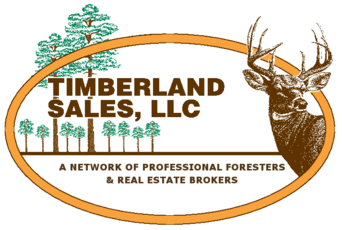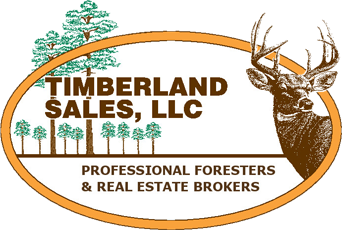- How do I list my property with a member of Timberland Sales? Contact us either by phone or sending us an email and one of our members will contact you.
- Should I buy a tract of land that is subject to an outstanding timber deed? Cleacut? Partially Cut? What needs to be understood about what will be left? Do not pass up what you consider to be a good buy. However, make sure that you have a good understanding of what condition the tract will be in after it is harvested. Whether it is a “clearcut” or “partial cut”, request a copy of the timber deed or contract and have a professional forester review it with you. He can explain the harvesting guidelines and what you may expect the property to look like when the harvesting is completed. As a “rule of thumb”, most landowners are not satisfied with the results.
- Should the land be surveyed? Surveys are expensive and not always needed. We recommend them only if there are potential problems with property boundaries or number of acres is being questioned. Some lending institutions may require a survey when the property is used as collateral. A survey will identify the number of acres being purchased. The sectional division of legal descriptions does not always identify the correct acreage, because of variations for some section sizes.
- When is a survey not needed? A survey is not needed when the property lines and corner markers are clearly and accurately identified.
- How do I find a reputable surveyor and how much do they charge? The best way to find a reputable surveyor is to ask someone who uses surveyors. Make sure that the surveyor is licensed as a “Professional Engineer” or “Registered Land Surveyor”. There is no set fee for surveying. Surveyors may charge a crew fee per day, per hour, or a quoted fee for the job.
- How do I find a reputable forester to advise me on management decisions and help carry out those decisions? In Mississippi no person in either public or private capacity shall practice or offer to practice forestry, unless they have met specific qualifications and be registered by the Mississippi Board of Registration for Foresters. A consulting forester is someone who provides services to the public for a fee. A list of consulting foresters throughout Mississippi may be obtained from state and federal forestry agencies. Many consulting foresters belong to the Association of Consulting Foresters of America, Inc. and may be located on the web site: www.acf-foresters.com.
- Where can I get assistance to find and purchase land? Mississippi has many knowledgeable real estate professionals who can assist an interested buyer in locating and purchasing land. The minimum that one should expect from an agent is to have met the state requirements for licensing as a real estate agent. In addition, one should seek an advisor who has the expertise to evaluate each potential land purchase as to what the buyer needs. At Timberland Sales, LLC, our members offer superior service in the area of timber and recreational land acquisition and marketing. This is due to the fact that we are not only real estate professionals, but also professional consulting foresters.
- How important is deeded access or easement to land? Deeded access to a property is associated with tracts of land that do not front a public road. In this case it becomes necessary to cross the property of an adjacent owner in order to use the property.
There are different types of easements, but a deeded or a perpetual recorded easement is the most desirable. A deeded easement is an actual right-of-way easement to a property that is described with the property, recorded in the deed, and therefore continues with the land if it is sold. Typically, property that has road frontage is the most valuable and the most desirable to investors. However, land that has a deeded access can often, depending on the condition of the easement, offer the same security to investors as road frontage. Although there are legal remedies to gain access to properties which have no apparent access, they still are more difficult to sell, and tend to be less valuable when sold. Most lenders are hesitant to loan money to purchase tracts without permanent access. - What should be done if there is evidence of adverse possession? Adverse possession can result in the transfer of title to real property or land, by possession, or use of said property for a statutory period under certain conditions. Basically, this means that a possessor of real property can take legal claim to ownership of the property after certain conditions have been satisfied. First, the possessor must use or occupy the real property for a required length of time which is established by state statutes. In Mississippi, this statute is set at 10 years. Statutes vary between states with a range of 5-20 years. Secondly, the possessor must prove that their occupancy of the real property has been in a nonpermissive manner which is actual, open, notorious, exclusive and adverse for the described statutory period. This process will result in a loss of land or real property by one party and a taking by one party. Regardless of which role one might find themselves in, it is good advice to seek a qualified attorney to assist you with the process. Adverse possession often results when a boundary line has been clearly marked and accepted, even though a later survey may show the historical boundary line is not in the correct location.
- Is a title opinion from an attorney necessary? A title opinion often is not a requirement in the purchase of real property, but is a veil of protection that is in the interest of the purchaser. It is an actual examination of the deed records or other title documents to verify that the title is valid. This process should reveal any clouds on the title such as rights-of-way, easements, and other issues which might hinder the transfer of the title. This is usually performed by an attorney or title company in which they provide a summary of the documents examined. Depending on the circumstances of the purchase, the title opinion may or may not be required. However, it is probably always a good idea to confirm title.
- Should I get title insurance? Title insurance is a policy issued by a title company after examining the condition of the title to real property, which represents the state of that title ensuring the accuracy of its search against claims of title defects. This form of insurance is usually taken out by the purchaser or finance company, and warrants the validity of the title up to the original purchase price. Depending on the circumstances of the purchase, title insurance may or may not be a requirement to complete a purchase of real property. It does, however, offer some protection against some potential pitfalls.
Home » FAQ
Contact Us
Southern Resource Service Inc.
Brad Campbell, Broker
P.O. Drawer 1645
1211 Highway 389
Starkville, MS 39759
Phone: 662.242.9104
Forest Pro LLC
Mark Dale, Broker
P.O. Box 152
1710 W. Broad St.
Monticello, MS 39654
Phone: 601.587.4446
Steve Butler, Broker
Tall Timbers Real Estate
11775 Highwary 18
Raymond, MS 39154
Phone: 601.591.4006
Chad Anderson, Broker
TimberCorp Services
6193 Henderson Road
Brandon, MS 39042
Phone: 601.591.4008
Brad Campbell, Broker
P.O. Drawer 1645
1211 Highway 389
Starkville, MS 39759
Phone: 662.242.9104
Forest Pro LLC
Mark Dale, Broker
P.O. Box 152
1710 W. Broad St.
Monticello, MS 39654
Phone: 601.587.4446
Steve Butler, Broker
Tall Timbers Real Estate
11775 Highwary 18
Raymond, MS 39154
Phone: 601.591.4006
Chad Anderson, Broker
TimberCorp Services
6193 Henderson Road
Brandon, MS 39042
Phone: 601.591.4008
© Copyright 2024 timberlandsales.com. All Rights Reserved. Sitemap - Real Estate Website Design by Agent Image







